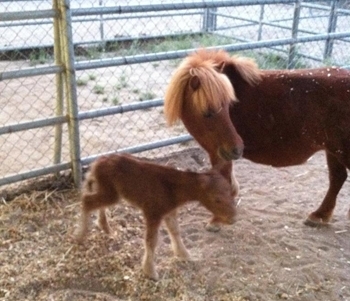Horses are an integral part of our leading-edge treatment. These powerful yet vulnerable creatures have a large limbic system, the part of the brain responsible for emotion and intuition, which greatly contributes to their keen ability to detect danger. Perhaps most importantly, this also plays a part in their heightened sensitivity to human emotion, body language, and energy. At The Meadows Ranch, our patients learn how to be predictable, trustworthy and communicative from the bonds they establish during our Equine Therapy program.
This is why we are excited about our new addition to our mascot family, miniature horse, Cinnamon! She was born on March 17, 2014 on St. Patrick’s day between 10:30 pm -11:00 pm. Harry our security guard helped to deliver the young foal. She weighs approximately 20 pounds and has light brown coloring. She resembles her mother, Nutmeg, in color and is now considered the mini-mini of The Meadows Ranch. Both the mare and our new addition are being carefully monitored by our excellent Equine Therapy staff.
They are pleased to report that Cinnamon began walking and drinking milk from her mother immediately after she was born. So far, Cinnamon and Nutmeg have taken a brief nap and they have been soaking in the Arizona sunshine. Enthusiasm has been shared by both humans and animals alike; as Charlie, the dad, and Comet, Nutmeg’s brother, have been seen dancing around, jumping and being quite playful. This is a truly joyous occasion at The Meadows Ranch.
The Miniature horses that we have here at The Meadows Ranch, Center for Eating Disorder Treatment, are Nutmeg (the mom), Charlie (the dad), Comet (the brother) and the new addition Cinnamon (the baby girl). These miniatures are friendly and interact well with our patients and staff. For this reason they are the stable mascots.
Miniatures have natural horse behaviors, including a natural fight or flight instinct, and must be treated like a full-sized equine. Some miniatures have been known to serve as companion guides for the blind. They are also trained as service animals, akin to assistant dogs for people with disabilities. Miniature horses are also trained for driving carts, equine agility and other competitive horse show type events. While miniature horses can be trained to work indoors, they are still real horses and are healthier when allowed to live outdoors (with proper shelter and room to run).
They are generally quite hardy, often living longer on average than some full-sized horse breeds; the average life span of miniature horses is from 25 to 35 years.
For additional information about the treatment of eating disorders, please call to speak to a Counselor at 866-390-5100 and we will contact you with the information you need.

